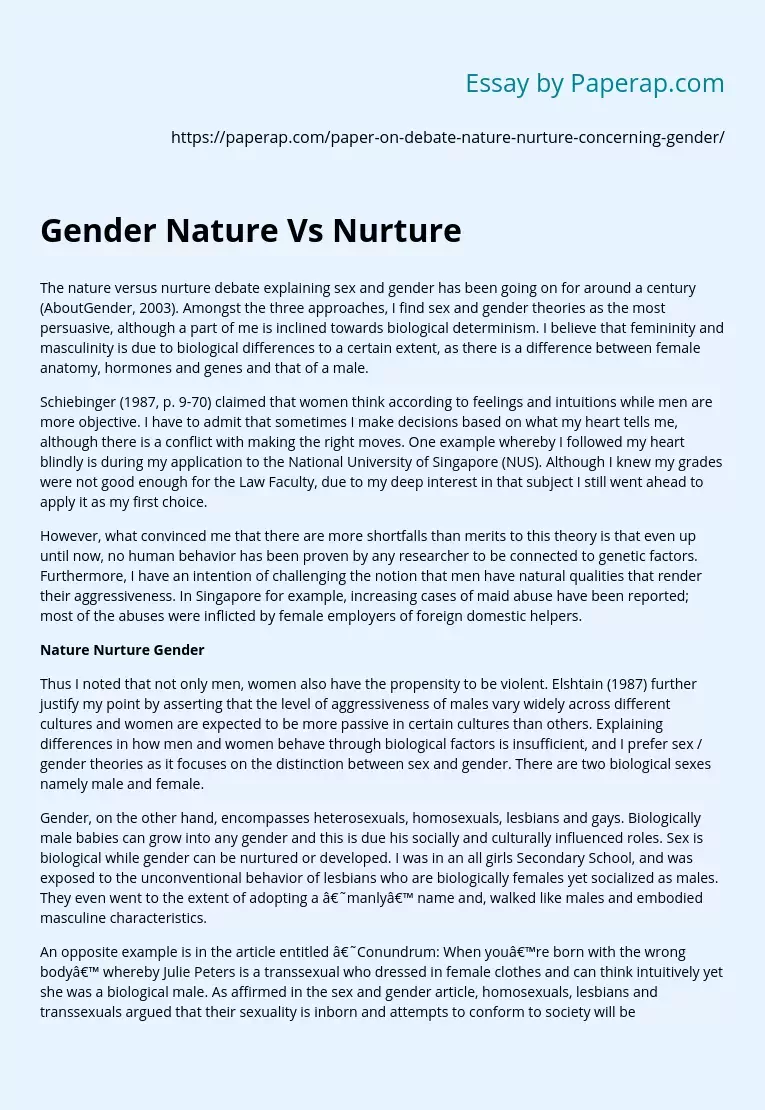Gender Nature Vs Nurture
The nature versus nurture debate explaining sex and gender has been going on for around a century (AboutGender, 2003). Amongst the three approaches, I find sex and gender theories as the most persuasive, although a part of me is inclined towards biological determinism. I believe that femininity and masculinity is due to biological differences to a certain extent, as there is a difference between female anatomy, hormones and genes and that of a male.
Schiebinger (1987, p. 9-70) claimed that women think according to feelings and intuitions while men are more objective.
I have to admit that sometimes I make decisions based on what my heart tells me, although there is a conflict with making the right moves. One example whereby I followed my heart blindly is during my application to the National University of Singapore (NUS). Although I knew my grades were not good enough for the Law Faculty, due to my deep interest in that subject I still went ahead to apply it as my first choice.
However, what convinced me that there are more shortfalls than merits to this theory is that even up until now, no human behavior has been proven by any researcher to be connected to genetic factors. Furthermore, I have an intention of challenging the notion that men have natural qualities that render their aggressiveness. In Singapore for example, increasing cases of maid abuse have been reported; most of the abuses were inflicted by female employers of foreign domestic helpers.
Nature Nurture Gender
Thus I noted that not only men, women also have the propensity to be violent.
Elshtain (1987) further justify my point by asserting that the level of aggressiveness of males vary widely across different cultures and women are expected to be more passive in certain cultures than others. Explaining differences in how men and women behave through biological factors is insufficient, and I prefer sex / gender theories as it focuses on the distinction between sex and gender. There are two biological sexes namely male and female.
Gender, on the other hand, encompasses heterosexuals, homosexuals, lesbians and gays. Biologically male babies can grow into any gender and this is due his socially and culturally influenced roles. Sex is biological while gender can be nurtured or developed. I was in an all girls Secondary School, and was exposed to the unconventional behavior of lesbians who are biologically females yet socialized as males. They even went to the extent of adopting a ‘manly’ name and, walked like males and embodied masculine characteristics.
An opposite example is in the article entitled ‘Conundrum: When you’re born with the wrong body’ whereby Julie Peters is a transsexual who dressed in female clothes and can think intuitively yet she was a biological male. As affirmed in the sex and gender article, homosexuals, lesbians and transsexuals argued that their sexuality is inborn and attempts to conform to society will be ‘unnatural’. While recognizing that sex is determined by the biological characteristics, gender characteristics on the other hand, is largely determined by social, cultural and historical contexts.
In different societies and cultures, men and women are socialized into different roles (Giddens 1997, p. 108). The concept of ‘nurture’ gains the upper hand in sex / gender theory. Oakley (1972, p. 54-55) did a fine job of illustrating three different New Guinea tribes and the different roles men and women fall into. In the first tribe, the Arapesh, both men and women assume passive roles that resemble the femininity in our own culture. In the second tribe which is Mundugumor, both sexes assume masculinity and both sexes are brought up to be independent.
In the last tribe of the Tchambuli, the males behave like our females by gossiping, shopping and wearing ornaments while the women shave their heads and are assertive. In Singapore, women are expected to be graceful while the men are more domineering. In the Malay community here for example, the male is considered the ‘man of the house’, and when he makes reasonable decisions, his wife and children have the onus to listen to him. However, I agree with statement in the article that there are difficulties in distinguishing between sex and gender and between biology and social attributes.
Giddens (1997, pg 109) criticized sex / gender theories as rigid, whereby society expects individuals to assume assigned roles as males or females. Importantly, I acknowledge that humans are not computers that can be programmed accordingly only by social or cultural characteristics. People can modify themselves, for example in the case of Julie Peters as described in the article following the sex and gender piece. Julie Peters undergone hormone treatments, electrolysis and face waxing to transform herself.
Gender Nature Vs Nurture. (2019, Dec 05). Retrieved from https://paperap.com/paper-on-debate-nature-nurture-concerning-gender/

